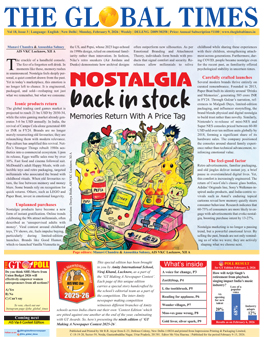NOSTALGIA back in stock
Manavi Chandra & Anoushka Sahney
AIS VKC Lucknow, XII A
The crackle of a handheld console. The fizz of a forgotten soft drink. In moments like these, memory rushes in unannounced. Nostalgia feels deeply personal, a quiet comfort drawn from the past. Yet in today’s marketplace, this emotion is no longer left to chance. It is engineered, packaged, and sold—reshaping not just what we remember, but what we consume.
Iconic products return
The global trading card games market is projected to reach 21 bn USD by 2030-34, while the retro gaming market already generates 3-6 bn USD annually. In India, the revival of Campa Cola alone generated 400 cr INR in FY24. Brands are no longer merely resurrecting old favourites; they are relaunching them with modern relevance. Pop culture has amplified this revival. Netflix’s Stranger Things rebuilt 1980s aesthetics into a commercial ecosystem. Upon its release, Eggo waffle sales rose by over 10%. Fast food and cinema followed suit. McDonald’s adult Happy Meals, with collectible toys and retro packaging, targeted millennials who associated the brand with childhood rituals. When old favourites return, the line between memory and money blurs. Some brands rely on recognition for quick returns. Others, such as LEGO and Paper Boat, invest in emotional longevity.
Unplanned purchases
Nostalgic products have become a new form of instant gratification. Online trends celebrating the 90s attract millennials, often described as ‘unsupervised adults with money’. Viral content around childhood toys, TV shows, etc, fuels impulse buying, particularly during limited-edition launches. Brands like Good Humor, which re-launched Vanilla Viennetta in the US, and Pepsi, whose 2023 logo echoed its 1990s design, relied on emotional familiarity rather than innovation. In fashion, Nike’s retro sneakers (Air Jordans and Dunks) demonstrate how archival designs often outperform new silhouettes. As per Emotional Branding and Attachment Theory, individuals form bonds with products that signal comfort and security. Re-releases allow millennials to relive childhood while sharing these experiences with their children, strengthening attachment across generations. Furthermore, during COVID, people became nostalgic even for the recent past, as familiarity offered psychological stability in uncertain times.
Carefully crafted launches
Several modern brands thrive entirely on curated remembrance. Founded in 2013, Paper Boat built its identity around ‘Drinks and Memories’, generating 585 crore INR in FY24. Through Gulzar’s narration, references to Malgudi Days, limited-edition packaging, and influencer storytelling, the brand blends physical and digital nostalgia to build trust rather than novelty. Similarly, Nintendo’s re-release of mini-NES and Super NES consoles priced between 60-80 USD sold over ten million units globally by 2018, forming a significant share of its hardware sales. The company positioned the consoles around shared family experience rather than technical advancement, reinforcing emotional value.
The feel-good factor
Retro advertisements, familiar packaging, and old jingles deliver instant joy, a brief pause in overstimulated digital lives. Yet, this comfort is increasingly engineered. The return of Coca-Cola’s classic glass bottles, Adidas’ Originals line, Sony’s Walkman-inspired audio products, and India-centric revivals such as Amul’s enduring topical cartoons reveal how memory quietly steers consumer behaviour. Research indicates that 60-75% of consumers are more likely to engage with advertisements that evoke nostalgia, boosting purchase intent by 13-27%.
Nostalgia marketing is no longer a passing trend, but a powerful emotional lever. By selling the past, brands are not only reminding us of who we were; they are actively shaping what we choose next.









